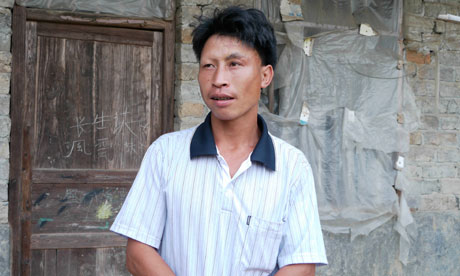 |
| "Duan Biansheng, one of many unmarried men in the 'bachelor village' of Banzhushan in Hunan province." (Tania Branigan) |
By Tania Branigan
The Guardian, September 2, 2011
"He wants a wife, of course. But ask what kind of woman he seeks and Duan Biansheng looks perplexed. 'I don't have any requirements at all,' said the 35-year-old farmer. 'I would be satisfied with just a wife.' His prospects of finding one, he added, are 'almost zero'. There are dozens of single men in Banzhushan village, perched high on a remote mountain peak in central Hunan province -- and not one unattached woman of marriageable age. Tens of millions of men across China face a future as bachelors. They are a source of pity, not envy, in a country where having children is central to life. Duan worries about growing old with no one to care for him. He chafes at the unhelpful pressure to wed from his parents and neighbours. The worst thing of all is the loneliness. This is the perverse outcome of the country's longstanding preference for sons, and its sudden modernisation. Traditionally, the family line is passed via men. When a woman marries, she joins her husband's family. Having a boy is a cultural and a pragmatic choice: you expect him to continue your lineage and support you in old age. The result has long been a surplus of men, because of female infanticide or excess female deaths through neglect. But in the last 20 years, the problem has exploded thanks to the spread of prenatal scans.
Sex-selective abortion is illegal, but is clearly widely practised. The normal human birth ratio is 106 males for every 100 females. In China, that has risen to 118 boys. That means 30 to 50 million men will fail to find wives over the next two decades, according to Prof Li Shuzhuo of the institute for population and development studies at Xi'an Jiaotong University. It is equivalent to every male in the UK dying a bachelor. Experts have warned that these unmarried 'bare branches' pose a threat to social stability. Some suggest that excess men leads to more crime and sexual violence; officials have warned of increased women trafficking. Already, women are kidnapped and sold as wives, as villagers in Banzhushan acknowledge. Other commentators say that while some women are at greater risk, many will benefit from better treatment due to their scarcity. 'We can find no evidence, as yet, for a destabilising influence,' said Prof. Therese Hesketh of the UCL's institute of global health, who has co-authored a paper on the impact of the imbalance. Crime is not higher in high sex ratio areas, but it may be too early [to see the effects]. Women want to marry men with money or prospects. 'This is not about men oppressing women -- maybe the reverse. The situation is good for women.' Poverty is as much to blame for 'bachelor villages' as the skewed sex ratio. Women can improve their status by 'marrying up'; men are rarely able to do so. Girls born in poor areas leave and outsiders stay away. 'Even though there are girls from this village, and we grew up together, they know they can have a better life outside,' said Duan. In late summer, Banzhushan -- 'chestnut bamboo mountain' -- is mesmerisingly beautiful. Large brown butterflies flutter among the tallow trees as you gaze down into deep valleys. But it is simply too remote to be a good home, even to its 300 residents. They struggle to grow enough potatoes, maize and rice to feed themselves. Selling wood helps, but incomes are just 300-400 yuan (£30-40) a year, compared with 5,900 yuan for the average rural resident. Pieces of plastic and cardboard flap across the glass-free windows of tatty brick houses. In winter, thick snows can cut off the village for two weeks at a time. Conditions here are far better than 20 years ago. The long, steep path to the village has been bulldozed into a road and there is electricity, mobile phone and TV coverage. The government has even built a two-storey community centre, shining white amid the pines and bamboo. But these developments have worsened the predicament for bachelors. It is easier to learn about the outside world and easier to move away, and local improvements have been far outpaced by the rapid changes elsewhere. 'Thirty or 40 years ago, girls from the valley were willing to marry up here,' said Jin Shixiu, 54. 'Everyone was poor and hungry. Transport was bad everywhere. Now the roads down there are better but up here, it's still the same. Some guys even met women outside, but when they came and saw our houses and how poor we are, they just went away.' Jin longs for a grandchild -- 'everyone else is holding theirs' -- but says she does not dare to hope for one. She encouraged her two sons to move to Shenzhen in search of money and wives but her eldest, now 32, is still single. Even when men become migrant workers, they lack the education to find decent jobs, said the village's party secretary, Jin Yisong. 'It is still very hard to help these men find wives. I really don't know how to do it,' he said. [...]"
No comments:
Post a Comment